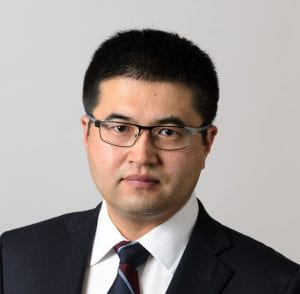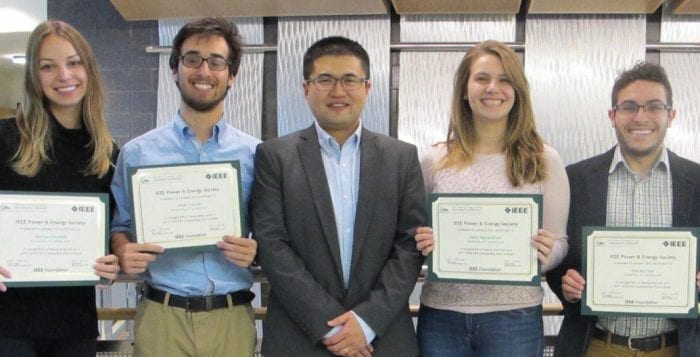By Daniel Dunaief
If Peng Zhang succeeds in his work, customers on Long Island and elsewhere will no longer lose power for days or even hours after violent storms.
One of the newest additions to the Department of Electrical and Computer Engineering at Stony Brook University, Zhang, who is the SUNY Empire Innovation associate professor, is enhancing the resiliency and reliability of microgrids that may be adaptable enough to provide energy to heat and light a home despite natural or man-made disruptions. Unlike the typical distributed energy network of most utilities around the country, microgrids are localized and can function on their own.

A microgrid is a “central theme of our research,” said Zhang, who joined Stony Brook at the beginning of September. “Even when a utility grid is down because of a hurricane or an attack, a microgrid is still able to supply the local customers” with power. He is also using quantum information science and quantum engineering to empower a resilient power grid.
Zhang expects that the microgrid and utility grid will be more resilient, stable and reliable than the current system. A microgrid will provide reliable power even when a main grid is offline. The microgrid wouldn’t replace the function of the grid in the near future, but would enhance the electricity resilience for customers when the central utility is unavailable or unstable.
Part of his motivation in working in this field comes from his own experience with a weather-related loss of power.
Even though Zhang, who used his training in mathematics to develop an expertise in power systems, had been working on wind farms and their grid integration, he decided after Hurricane Irene and a nor’easter that he should do more research on how to restore power after a utility became unavailable.
Irene hit in August, while the nor’easter knocked out power in the winter. After the storms, Northeast Utilities, which is currently called Eversource Energy, asked him to lead a project to recommend solutions to weather-induced outages.
Zhang plans to publish a book through Cambridge University Press this year called “Networked Microgrids,” which not only includes his previous results but also presents his vision for the future, including microgrids that are self-healing, self-protected, self-reconfiguring and autonomous.
He recognizes that microgrids, which are becoming increasingly popular in the energy community, present a number of challenges for customers. For starters, the cost, at this point, for consumers can be prohibitively high.
Zhang can cut those expenses, however, by replacing hardware upgrades with software, enabling more of the current system to function with greater resilience without requiring as many costly hardware modifications.
His National Science Foundation project on programmable microgrids will last until next year. He believes he will be able to verify most of the prototypes for the programmable microgrid functions by then.
Zhang called advances in energy storage a “key component” that could improve the way microgrids control and distribute power. Energy storage can help stabilize and improve the resilience of microgrids.
He is eager to work with Esther Takeuchi, who has dual appointments at Stony Brook University and Brookhaven National Laboratory, not only on microgrid technologies but also on renewable integration in the transmission grid.
Zhang appreciates SBU’s reputation in physics, applied math, computer science and electrical and computer engineering. When he was young, he said he also heard about and saw Chen-Ning Yang, whom he described as a model and legend.
“I feel proud and honored to be working at Stony Brook where Dr. Yang taught for more than three decades,” he stated in an email.
In his lab, Zhang has six doctoral students, one visiting doctoral student and two master’s students. A postdoctoral researcher, Yifan Zhou, who worked with him at the University of Connecticut, will soon join his Long Island lab.
Zhang, who earned doctorates from Tsinghua University and the University of British Columbia, brought along a few grants from the University of Connecticut where he held two distinguished titles.
Zhang has “high expectations for the people who work for him,” Peter Luh, a board of trustees distinguished professor at the University of Connecticut, explained in an email. “However, he is considerate and helps them achieve their goals.”
Zhou, who comes from Tsinghua University, is working with him on stability issues in microgrids to guarantee their performance under any possible scenario, from a major storm to a cyberattack.
Zhang is working with Scott Smolka and Scott Stoller, both in the Computer Science Department at Stony Brook, on resilient microgrids
“We are planning to use simulations and more rigorous methods for formal mathematical analysis of cyberphysical systems to verify resiliency properties in the presence of fault or attacks,” said Stoller who described Zhang as a “distinguished expert on electric power systems and especially microgrids. His move to Stony Brook brings significant new expertise to the university.”
The Stony Brook scientists have created an exercise in which they attack his software systems, while he tries to ensure its ongoing reliability. Zhang will develop defense strategies to guarantee the resilience and safety of the microgrids.
Zhang was born in Shandong Province in China. He is married to Helen Wang, who works for a nonprofit corporation as an electrical engineer. The power couple has three sons: William, 13, Henry 10, and Benjamin, 8. They are hoping their sons benefit from the public school system on Long Island.
Zhang’s five-year goal for his work involves building an institute for power engineering, which will focus on microgrids and other future technologies. This institute could have 20 to 30 doctoral students.
An ambitious researcher, Zhang would like to be the leader in microgrid research in the country. “My goal is to make Stony Brook the top player in microgrid research in the U.S.,” he said.
Meng Yue, scientist in the Sustainable Energy Technologies Department at Brookhaven National Laboratory who has been collaborating with Zhang for over five years, anticipates that Zhang’s research will help consumers.
“As New York State has more aggressive renewable portfolio, I believe the research achievements will soon advance technologies in the power grid application,” he said.





